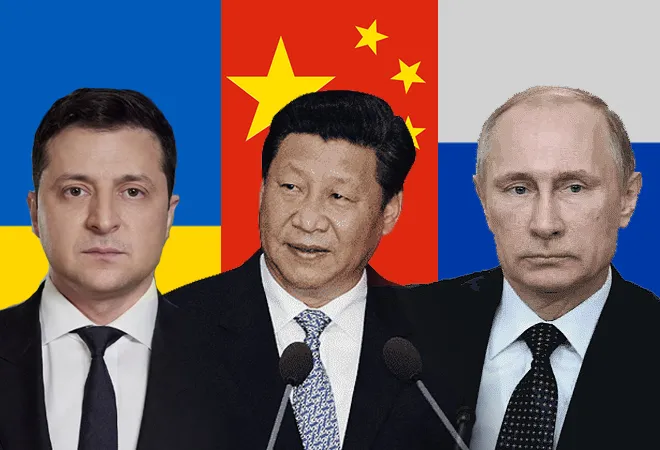
This brief is a part of The Ukraine Crisis: Cause and Course of the Conflict.
As the Ukraine crisis intensified in the last few days, there were lots of discussions in the Chinese internet if the military conflict in Europe is “good or bad for China”. There is one view that China is the clear winner of the ongoing Ukraine crisis. That Russia's entry into Ukraine brings huge benefits to China. Firstly, the United States (US) will now have no choice but to act. All the countries are watching the current situation in Ukraine. If the US does nothing but place sanctions on Russia, its credibility amongst its allies will be critically damaged, and its alliance system weakened—something that is good for China. On the other hand, if the US or NATO get involved in Ukraine militarily, it will diversify the US resources and jeopardise its Indo-Pacific strategy, which is even better for China. In fact, if the US and Russia get entangled in Ukraine for long, it will give China another 5-10 years of development opportunities, after which China will become somewhat unstoppable. On the other hand, if the US and Russia made peace quickly after testing each other, China might like to seize the short window of opportunity to achieve national reunification with Taiwan. Not to mention, the outbreak of the Ukrainian crisis will further cement China-Russia ties, as reeling under stringent economic sanctions, Russia will have little option but to rely more on China. Thirdly, the Ukraine crisis means the end of all possibilities for the Western powers (German-French Continental Europe, Russia and Anglo-American Group of English-speaking Countries) coming together against China—China’s biggest concern for long, which rather intensified as Ukraine negotiations went on between US and Russia in the past few months. But with Russia's march into Ukraine, it is now understood that the door of Russia's integration into Europe is completely closed, and the relations between the US and Russia are completely estranged, which means that the US-EU-Russia joint front against China has now become virtually impossible. This, therefore, strategically establishes China in a more favourable position in China-US-Russian strategic triangle, giving China much more room for manoeuvre and better scope for continued development, as European funds will keep flowing into China and so will cheap natural gas from Russia.
If the US and Russia get entangled in Ukraine for long, it will give China another 5-10 years of development opportunities, after which China will become somewhat unstoppable.
The other view is rather cautious, on grounds that the situation in Ukraine is highly volatile and uncertain, and that it is difficult to predict how it will evolve in the future and if or to what extent China might get dragged into the conflict, even though it remains a non-party to the situation. It is well understood in Beijing that the growing consensus within Western strategic circles over the long-term strategic challenge from China is unlikely to subside overnight due to the current crisis in Europe and that a case is being built in the West that Russia’s aggressive actions in Ukraine, is partly due to tacit support or backing from China. It has been noted with concern how the recent China-Russia joint statement has been interpreted by the international community as the two countries seeking to construct an alternate international order and how various US Congressmen, officials, influential think tank heads, and even the Australian Prime Minister have publicly criticised China’s role in the Ukraine crisis. They have also advocated the idea of “Russia-China joint responsibility” and the need for punitive actions against both. During the regular press conference of the Chinese Ministry of Foreign Affairs on 24 February 2022, the day Russia invaded Ukraine or carried out its “special military operations’ in Ukraine, the Chinese Spokesperson Hua Chunying was bombarded with several loaded questions from the international media, like “Does China support President Putin's invasion of Ukraine?... Did Russia seek the consent of China to attack Ukraine when he visited China a few weeks ago… Will China call on Russia to withdraw its troops? …Has China taken sufficient measures to actively promote peace in Ukraine?”, etc.
But China’s strategy in the ongoing Ukraine crisis, as noted by some Chinese commentators, is actually to "talk more and do less", and strike a fine balance between supporting Russia, while also ensuring that its support for Russia does not provoke the US and the EU too much. China’s official response so far encouraging dialogue and negotiation between all parties, while also more or less sticking to the Russian position in the conflict, very much alludes to this strategy. In the worst-case scenario for China, it is argued, Russia, EU, and the US will all have dissatisfaction with China to various extent for various reasons and in the best-case scenario, Russia, the European Union, and the United States will all understand and accept China’s position. Chinese analysts, therefore, advocate maximum vigilance against, what is understood as, the trend of various parties “seeking to shift their grievances” on China, aimed at deteriorating China-EU, China-Russia, or China-US ties.
The growing consensus within Western strategic circles over the long-term strategic challenge from China is unlikely to subside overnight due to the current crisis in Europe and that a case is being built in the West that Russia’s aggressive actions in Ukraine, is partly due to tacit support or backing from China.
China’s other concern regarding the crisis has been the future of its Belt and Road Initiative, the security of China's economic and trade routes to Europe, especially the operation of the China-Europe train, in case hostility persists long enough in the region. Not to mention, there are also concerns regarding the impact of the military conflict on the global economy, marked by disruption of global supply chains; consumption of global wealth, wiping out of productivity etc., which in turn will adversely affect the recovery and smooth functioning of the Chinese economy. But overall, there seems to be a broad consensus in Beijing that under the present circumstances the advantages from the Ukraine crisis far outweigh its disadvantages, in terms of China’s national interests.
China’s stand
As a backgrounder to the above discussion, it is important to note that as the Ukraine crisis simmered since November, 2021, China-Russia interactions has visibly gained pace. After the first-ever China-Russia joint naval drills in the western Pacific in October 2021, Chinese President Xi Jinping and Russian President Vladimir Putin held a video meeting on 15 December 2021, the second of its kind during the year, where they “pledged to cooperate more on safeguarding the two countries' core interests and upholding international fairness and justice”. Before that, Chinese Premier Li Keqiang and Russian Prime Minister Mikhail Mishustin met virtually to prepare ground for deeper cooperation between the two countries in areas like energy, agriculture, and technology. High-level meetings continued through the year end as China-Russia strove to strengthen investment cooperation, defence cooperation, and technology cooperation amongst others. Both sides also exchanged congratulatory notes, expressing satisfaction on successfully completing the Year of Scientific and Technological Innovation in 2021 and launching the Year of Sports Exchange programme in 2022 and reaffirming President Putin’s attendance for the opening ceremony of the Beijing Winter Olympics.
Chinese Premier Li Keqiang and Russian Prime Minister Mikhail Mishustin met virtually to prepare ground for deeper cooperation between the two countries in areas like energy, agriculture, and technology.
Beginning of this year, when Ukraine had already emerged as a major flashpoint, Chinese Foreign Minister Wang Yi spoke to U.S. Secretary of State Antony Blinken on 27 January where he, for the first time publicly expressed Chinese support for “Russia's legitimate security concerns”. At the international level, on 31 January, China along with Russia voted against proceeding with a US-proposed public meeting on Ukraine at the UNSC. China's Permanent Representative to the UN Zhang Jun articulated the Chinese stance on the issue, which advocated implementation of the New Minsk Agreement, coming up with an “effective and sustainable European security mechanism through negotiations”, along with “Russia's legitimate security concerns” to be taken seriously into consideration. As tensions escalated further on the Russia-Ukraine border, Xi-Putin physical summit was held on 4 February 2022, where both sides expressed united stand on Taiwan and NATO amongst other agreements. On 19 February , minister Wang Yi urged “all parties to take due responsibilities and make efforts towards peace on the Ukraine issue, instead of just escalating tensions, creating panic and even playing up war threat”, when answering questions on Ukraine crisis at the 58th Munich Security Conference. Eventually as Russia recognised the two breakaway regions in eastern Ukraine as “independent and sovereign states”, Chinese Foreign Minister Wang Yi, in his telephonic conversation with U.S. Secretary of State Antony Blinken, a second one since the beginning of the year, highlighted that “China will continue to keep contacts with all parties in accordance with the rights and wrongs of the issue itself”. On the same day, China's permanent representative to the United Nations, Zhang Jun, advocated continuation of dialogue and consultation, and seeking “reasonable solutions to address each other's concerns”. As full-scale military conflict broke out in Ukraine, President Xi, in a telephonic conversation with his Russian counterpart on 25 February 2022, stated that “the Chinese side supports the Russian side in solving the issue through negotiation with the Ukrainian side”. On 26 February, China abstained from voting along with India and the United Arab Emirates on a US-sponsored UN Security Council resolution against Russia. On the same day, Minister Wang Yi while briefing certain European officials, further clarified China’s present position on the Ukraine crisis, that it respects both Ukraine’s sovereignty as well as Russia's security concerns.
The views expressed above belong to the author(s). ORF research and analyses now available on Telegram! Click here to access our curated content — blogs, longforms and interviews.




 PREV
PREV


